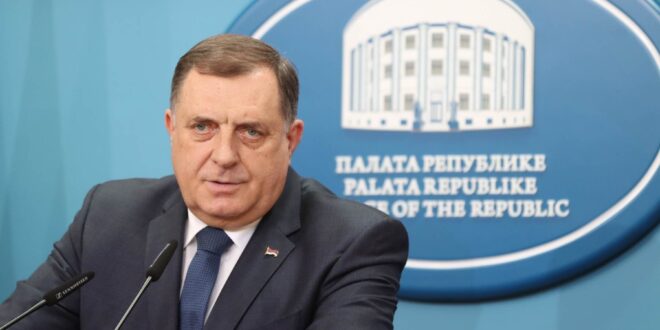After criticising a proposed new defamation law, the EU and US have also condemned a proposed new Bosnian Serb law allowing the entity to designate NGOs as ‘foreign agents’, calling it ‘unacceptable’.
The EU and US have criticised plans by Bosnian Serb leader Milorad Dodik, president of Bosnia’s mainly Serb-dominated Republika Srpska entity, to push a new Russian-style law which would allow the entity to mark civil society and non-governmental organisations as “foreign agents”.
Dodik did not mention Russia and claimed it would be identical to the law in the United States. “In their law, the US refers to foreign non-governmental organisations or those financed by foreigners as foreign agents on US territory,” Dodik told the media last week, adding that the terminology will simply be adapted, and “instead of US, it will say Republika Srpska.”
But the US embassy on Friday last week dismissed the comparison.
“We’ve already seen this movie and we know how it ends. When Russia expanded its foreign agent legislation in 2020, it claimed that it was just copying the American model. Nothing could be further from the truth, and we saw the results,” the US embassy to Bosnia wrote.
The announcement came days after his government adopted draft changes to the criminal code of Republika Srpska that would impose fines of up to tens of thousands of euros for defamation, which was decriminalised in 2003. Many media outlets in the entity have said this will increase censorship.
“Recently, the authorities in Republika Srpska announced plans to adopt two repressive, undemocratic laws that, if implemented, would severely undermine the rights and freedoms of people living in Republika Srpska,” the embassy continued.
“These laws would only benefit the ruling coalition in its efforts to consolidate its power, and would be detrimental to everyone else,” it added.
The EU called the plan “unacceptable” and accused the RS of being “afraid” of civil society.
The spokesperson of the Delegation of the European Union to Bosnia, Ferdinand Koenig, said the announcement of “regulations that could significantly limit the space for civic engagement are considered unacceptable by the EU,” online magazine BUKA reported.
“The authorities of RS should not be afraid of the work of civil society organisations. On the contrary, their engagement is a crucial component of democratic societies,” Koenig added.
The US Foreign Agents Registration Act, or FARA law, to which Dodik referred, imposes public disclosure obligations on persons representing foreign interests or receiving finances from abroad.
Dodik notably mentioned the decision of the Open Society Foundation, which is run by the liberal billionaire Gorge Soros, to move its Balkan headquarters from Albania’s capital, Tirana, to the Bosnian capital, Sarajevo.
“That is an obvious intention to act on the principle they have learned to destabilise society. Of course, we will protect ourselves from that. Soros is unacceptable here,” Dodik added.
The opposition mayor of Banja Luka, Republika Srpska’s administrative centre, who often opposes Dodik, appeared to agree with him on this issue. “Every organisation should be checked,” he said.
“I don’t see why the RS shouldn’t protect itself further. If Austria, Germany, America, whoever East-West, has an interest in financing someone here, they can be the most noble, but they can also be otherwise, so it needs to be defined,” Stanivukovic said, Novi Dani reported.
BIRN asked the government of Republika Srpska for more details about the plan. “More information will be provided by the line ministry,” it said. Howewver, the Ministry of Administration and Local Self-Government of the Republika Srpska did not reply to our query by the time of publication.
 Eurasia Press & News
Eurasia Press & News




